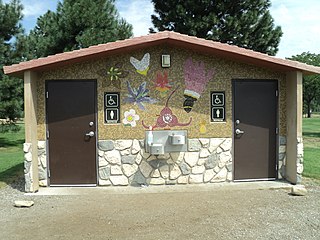
Cadw is the historic environment service of the Welsh Government and part of the Tourism and Culture group. Cadw works to protect the historic buildings and structures, the landscapes and heritage sites of Wales, to make them available for the public to visit, enjoy, and understand their significance. Cadw manages 127 state-owned properties and sites. It arranges events at its managed properties, provides lectures and teaching sessions, offers heritage walks, and hosts an online shop. Members of the public can become members of Cadw to gain membership privileges.
The British Academy of Film and Television Arts is an independent trade association and charity that supports, develops, and promotes the arts of film, television and video games in the United Kingdom. In addition to its annual award ceremonies, BAFTA has an international programme of learning events and initiatives offering access to talent through workshops, masterclasses, scholarships, lectures, and mentoring schemes in the United Kingdom and the United States.

In the United Kingdom, a listed building is a structure of particular architectural or historic interest deserving of special protection. Such buildings are placed on one of the four statutory lists maintained by Historic England in England, Historic Environment Scotland in Scotland, Cadw in Wales, and the Historic Environment Division of the Department for Communities in Northern Ireland. The classification schemes differ between England and Wales, Scotland, and Northern Ireland. The term has also been used in the Republic of Ireland, where buildings are protected under the Planning and Development Act 2000, although the statutory term in Ireland is "protected structure".
Education in the United Kingdom is a devolved matter, with each of the countries of the United Kingdom having separate systems under separate governments. The UK Government is responsible for England, whilst the Scottish Government, the Welsh Government and the Northern Ireland Executive are responsible for Scotland, Wales and Northern Ireland, respectively.

The British Computer Society (BCS), branded BCS, The Chartered Institute for IT, since 2009, is a professional body and a learned society that represents those working in information technology (IT), computing, software engineering, computer engineering and computer science, both in the United Kingdom and internationally. Founded in 1957, BCS has played an important role in educating and nurturing IT professionals, computer scientists, software engineers, computer engineers, upholding the profession, accrediting Chartered IT Professional (CITP) and Chartered Engineer (CEng) status, and creating a global community active in promoting and furthering the field and practice of computing.
RHS Britain in Bloom is the largest horticultural campaign in the United Kingdom. It was first held in 1963, initiated by the British Tourist Board based on the example set by Fleurissement de France, which since 1959 has promoted the annual Concours des villes et villages fleuris. It has been organised by the Royal Horticultural Society (RHS) since 2002.

The Quality Assurance Agency for Higher Education is the United Kingdom higher education sector's independent expert quality body. It has a remit to maintain and enhance the quality of teaching and learning in tertiary education in the United Kingdom and beyond. It conducts quality assessment reviews, develops reference points and guidance for providers, and conducts or commissions research on relevant issues.

A public toilet, restroom, bathroom or washroom is a room or small building with toilets and sinks for use by the general public. The facilities are available to customers, travelers, employees of a business, school pupils or prisoners. Public toilets are typically found in many different places: inner-city locations, offices, factories, schools, universities and other places of work and study. Similarly, museums, cinemas, bars, restaurants, and entertainment venues usually provide public toilets. Railway stations, filling stations, and long distance public transport vehicles such as trains, ferries, and planes usually provide toilets for general use. Portable toilets are often available at large outdoor events.

The Australian Qualifications Framework (AQF) specifies the standards for educational qualifications in Australia. It is administered nationally by the Australian Government's Department of Industry, with oversight from the States and Territories, through the Standing Council of Tertiary Education Skills and Employment. While the AQF specifies the standards, education and training organisations are authorised by accrediting authorities to issue a qualification.
A bursary is a monetary award made by any educational institution or funding authority to individuals or groups. It is usually awarded to enable a student to attend school, university or college when they might not be able to, otherwise. Some awards are aimed at encouraging specific groups or individuals into study.

Moto Hospitality Limited, trading as Moto, is a British service station operator which operates 59 motorway service stations across the United Kingdom. It is currently the UK's largest service area operator.

His Majesty's Theatre in Aberdeen is the largest theatre in north-east Scotland, seating more than 1,400. The theatre is sited on Rosemount Viaduct, opposite the city's Union Terrace Gardens. It was designed by Frank Matcham and opened in 1906.
Allied Irish Bank (GB) is a bank operating in the United Kingdom as a subsidiary of Allied Irish Banks (legally registered in the UK as AIB Group (UK) plc).

Unisex public toilets are public toilets that are not separated by sex or gender.
The Association of Authorised Public Accountants (AAPA) is a British professional body for public accountants.

Bridgend College is a further education college based in Bridgend, Wales. Founded in 1928 as the Bridgend Mining and Technical Institute, the college today has four campuses in Bridgend, Pencoed, Queens Road and Maesteg.

Emergency medical services in the United Kingdom provide emergency care to people with acute illness or injury and are predominantly provided free at the point of use by the four National Health Services (NHS) of England, Scotland, Wales, and Northern Ireland. Emergency care including ambulance and emergency department treatment is only free to UK residents and a charge may be made to those not entitled to free NHS care.

The Security Industry Authority (SIA) is the statutory organisation responsible for regulating the private security industry in the UK. Established as a non-departmental public body in 2003, the SIA reports to the Home Secretary under the terms of the Private Security Industry Act 2001 (c. 12).
In the UK education sector, there are a wide range of qualification types offered by the United Kingdom awarding bodies. Qualifications range in size and type, can be academic, vocational or skills-related, and are grouped together into different levels of difficulty. In England, Wales and Northern Ireland, qualifications are divided into Higher Education qualifications, which are on the Framework for Higher Education Qualifications (FHEQ) and are awarded by bodies with degree awarding powers, and Regulated qualifications, which are on the Regulated Qualifications Framework (RQF) and are accredited by Ofqual in England, the Council for the Curriculum, Examinations and Assessment in Northern Ireland and Qualifications Wales in Wales. In Scotland, qualifications are divided into Higher Education qualifications, Scottish Qualifications Authority qualifications and Scottish Vocational Qualifications/Modern Apprenticeships, which are on the Scottish Credit and Qualifications Framework (SCQF). Scottish Higher Education Qualifications are on both the SCQF and the FHEQ.

Blackwood Interchange is a bus station located in the town centre of Blackwood, Caerphilly, South Wales. It is situated on Gordon Road adjacent to the High Street.














